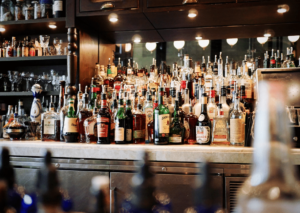 In America, drinking is a part of everyday “normal” adult life.
In America, drinking is a part of everyday “normal” adult life.
We have a drink to wind down after work, we have drinks to celebrate Fridays, we have special alcoholic beverages to celebrate holidays like Cinco de Mayo, New Year’s, and St. Patrick’s Day.
Unlike other substances of abuse, alcohol is a socially acceptable—and legal—intoxicant so its use doesn’t automatically send up red flags to most people.
But when does “normal” drinking cross over into problem drinking?
Understanding that line is a crucial first step to recognizing damaging patterns in your life. Unfortunately, it’s often the problem drinker themselves who is unwilling to admit when their behavior has “crossed over” into alcoholic territory.
Today, let’s look at 4 big early warning signs that your relationship status with alcohol has moved from “casual” to “it’s complicated.”
If you or a loved one have a drinking problem call us today at 800-626-1980 and learn about how we can help you take back control of your life.
 Alcoholism Warning Sign #1: Blackouts
Alcoholism Warning Sign #1: Blackouts
Do you sometimes not remember what happened when you’re drinking? This can be a major warning sign.
Blackouts come in many forms, but they all share a common element of memory impairment. Sometimes small pieces of “missing time” fade in and out (often called a “brownout”) while other times, large chunks of your evening are missing entirely (aka “blackout”).
These episodes can be extremely unnerving and dangerous. They often come on the heels of a binge drinking episode, although as your drinking progresses, they might become more unpredictable. If you’ve ever woken up wondering “what happened last night? How did I get here?,” you’ve experienced a blackout.
 Alcoholism Warning Sign #2: Negative Consequences
Alcoholism Warning Sign #2: Negative Consequences
When your drinking career began, drinking was probably associated with fun. Maybe you drank at parties, you drank to celebrate special events, or you drank to unwind with friends. At first, the worst consequences you experienced might have been a headache the next day.
When you’re an alcoholic drinker, your drinking career begins to take a different turn as time goes on. Simply put, bad things start to happen when you drink. Perhaps you begin to say or do things you regret. Maybe your attendance starts slipping at work. Maybe you find yourself making major parenting mistakes. It is common for alcoholics to drink and drive, get in fights, act out physically, or accidentally endanger themselves or others.
As time goes on, the likelihood that you experience DUIIs, incarceration, court-ordered rehabilitation, job loss, relationship instability, and child custody problems increases. These are all examples of negative consequences from drinking and they are all warning signs that you’re drinking is not “normal” and that you need help.
 Alcoholism Warning Sign #3: Lying
Alcoholism Warning Sign #3: Lying
Do you find yourself making excuses for your drinking? Do you find yourself drinking in secret? Hiding alcohol around the house? Sneaking in drinks at work?
These are all major warning signs of problem drinking. “Normal” drinkers are upfront about their alcohol consumption because they have nothing to hide. Problem drinkers fear the reactions of others because they know that their consumption has gotten out of hand so they conceal the amount and frequency of their alcohol intake.
Are you completely honest with yourself and others about your drinking? If not, that’s a major warning sign.
Alcoholism Warning Sign #4: Unsuccessful Attempts to Stop 
Have you tried to stop drinking, but found that you couldn’t?
This is perhaps the biggest warning sign of them all. Whether you merely attempted to “take a break” or you tried to cut drinking out of your life altogether, failing to curb your drinking is a hallmark of alcoholics everywhere. Another variation on this warning sign is trying to cap your intake to a certain amount (i.e. “I’ll only have two beers”) and failing to do so. If you ever feel out of control with your drinking, then it is highly likely that you are experiencing alcohol use disorder.
Alcoholism is a Disease and We Can Help
If you recognize yourself in any of these warning signs, it’s OK. You’re in good company.
The first thing to know is that it’s not your fault. Alcoholism is a disease, not a moral failing. There are physical issues in your body that make you more likely to have a toxic relationship with alcohol.
The good news is that we can help. At Transitions Recovery Program, we have helped thousands of alcoholics just like you to stop letting alcohol call the shots. Call us today at 800-626-1980 and learn about how we can help you take back control of your life.

















